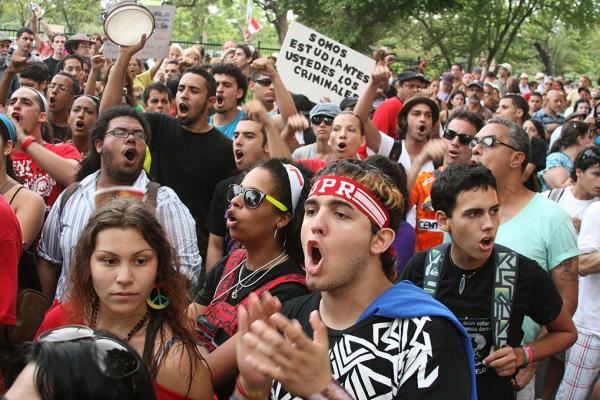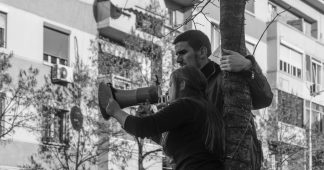by Pavan Kulkarni
February 06, 2019
A 20-year-old died on Tuesday noon after being shot amid country-wide protests in South Africa, mainly on issues related to financial support for students. The protests began on the campus of the University of Witwatersrand in Johannesburg on Monday morning against the alleged betrayal of the authorities, which left hundreds of students who had come to register for the new academic year from across the country homeless.
The management had previously promised that students, who were eligible for the ‘hardship fund’ – .an emergency fund for students who cannot pay outstanding debts on time – would be allowed to register for the new academic year and seek accommodation so long as they owed the university less than R100,000.
On Monday, when registration process was opened, students who came from as far as Western Cape, which is over 1,000 kilometres from the city, were not allowed to register on account of outstanding debts. Hundreds of students were thus left homeless.
“There are students who are sleeping in libraries,” Student Representative Council (SRC) president Sisanda Aluta complained.
Outraged, at least a 100 students marched through, disrupting some classes and departments. The SRC sought a meeting with the management that evening.
“Representatives of the senior executive team are working with the students’ representative council to resolve the outstanding matters related to accommodation and registration, particularly around the deployment of the Wits hardship fund,” the university’s spokesperson Shirona Patel reassured.
However, when no relief was offered to the affected students, on Tuesday morning, the students gathered before an on-campus building named Solomon Mahlangu House with the aim of launching a hunger strike.
“We had come here today for a peaceful protest that said to students, we are going to sit here, occupy with our blankets [and] books, and study. [We] came here unarmed, but [the management] brought us bouncers,” SRC president Aluta said, in a reference to the private security guards who were brought on campus to break up the protest. She noted with dismay that the management, which was unwilling to provide financial relief to distressed students, was nevertheless quick to spend two million Rands to hire security guards to crack down on the protesters.
Times Live reported that Buhle Zuma, another spokesperson for the university, “did not respond to the video footage in which security personnel were seen shoving students, but warned that students who were caught on video disrupting classes may face suspensions.”
In a statement, Zuma threatened, “The university is currently identifying those students who disrupted classes yesterday through video footage and statements. These students will be held to account, in line with the university’s policies, procedures and rules, which may include suspensions.”
About 560 kilometers to the southeast of Johannesburg, the city of Durban also witnessed unrest in a number of universities where students were protesting the delay in release of funds under National Student Financial Aid Scheme (NSFAS).
This scheme provides financial assistance to pursue education at public universities or at Technical and Vocational Education and Training (TVET) colleges for students whose total household income does not exceed R350,000 annually.
Covering the entire cost of tuition fee, registration fee and learning materials – apart from subsidizing transport, accommodation and meals – this scheme has been crucial in allowing youngsters from poor South African families to continue studying beyond the secondary level. Delays in releasing the funds, even as the academic year has started, would be a debilitating blow to the students dependent on the scheme.
Furious students reportedly torched vehicles in University of KwaZulu-Natal’s Westville and Howard College campuses. While on Monday, when the protests started, the Durban University of Technology had remained relatively calm, Tuesday saw students and private security guards clashing.
According to the version of the police, who arrested four students, “[About 30] students collected stones and rocks and went to the [DUT] block on Ritson Road and tried to storm the building while throwing rocks and bricks. One administration assistant and one security guard were injured during the incident, leading security to call for back-up.”
However, a video posted on Twitter shows student-members of Economic Freedom Fighters (EFF) party – a populist breakaway from the ruling African National Congress (ANC) – fleeing from armed guards wielding shields and batons. Some students are also seen hurling bricks behind in order to slow down the guards that were chasing them. One student, unable to escape the guards, was caught, beaten up and dragged away.
A 20-year old was reportedly shot in the abdomen by a private security guard outside an administrative building at the Steve Biko campus yesterday afternoon. Later, he died in the hospital when receiving treatment. While the student’s name has not been made public by the university yet, EFF identified him as Mlungisi Madonsela, and claimed he was a member of its Student Command (EFFSC).
“As a result of this tragic incident and many other violent altercations, the university management has decided to close the university until further notice,” DUT’s senior director for corporate affairs Alan Khan said in a statement.
The police had remained on campus last night, the Citizen reported. EFFSC has given a call to shutdown all the universities in the city today, in demand for free registration and free education, and in solidarity with the students of DUT.
Published at https://peoplesdispatch.org/2019/02/06/crackdown-on-students-in-south-africa-leaves-one-dead/











